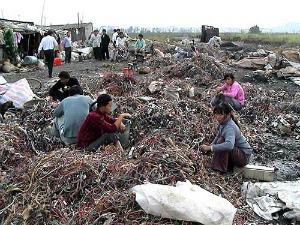Electronic Waste: U.S. Dumps Toxins In Developing Countries
 By Martha Avila, La Onda Verde
By Martha Avila, La Onda Verde
I would dare say that each of us, at some time, has been the target of massive advertising that creates our “need” to consume products that give continuity to the intentional chain that creates more need. Production, use and disposal becomes a string that we follow in order to achieve a socioeconomic status, greater ease and convenience or simply to satisfy a craving.
The list is endless; from iPods, iPads, Laptops, Blackberries, Andriods, TVs and more electronics which become obsolete on average every 18 months. But, we’ve wondered, where do our BlackBerry’s end up when their usefulness ends? Sadly the answer is they end up in a dump in an underdeveloped country where they not only pollute the land, water and air but they also threaten the health of those working legally or illegally in the landfills. Much of the electronic waste generated in the world is contaminated with waste such as lead, selenium, cadmium, chromium and mercury, which in addition to contaminating the natural resources can also poison the human body.
Designed for waste
When we compare the old toaster that belonged to Grandma, that was repaired and passed to our mother’s care, we don’t stop to question why our “new” stainless steel toaster, with temperature sensor, purchased on sale last year, no longer works. We can’t forget that we are part of the consumerism that devours huge amounts of natural resources, and is designed for a very short shelf life that ends in landfills and forces us to buy an as yet more modern appliance that will help boost production.
The United States currently is only able to recycle 20% of electronic waste (according to Basel Action Network, BAN). It’s more profitable and convenient to send the remaining 80% to “electronic graveyards” in countries like Mexico, Nigeria, China, and India where cheap labor (men, women and children) work daily, recycling metals that can be reused, extracting minerals and metals such as copper from monitor coils, gold and silver from electrical contacts, separating what’s usable from what’s not (without any safety measure) for a salary of $1.50 a day. In Guiyu – China, a region where much of the world’s e-waste is sent, 80% of children have extremely high levels of lead in their blood, because of the toxins in electronics, many of which originate in the U.S.
Every year 24 million computers in the U.S. (their residents buy more computers than any other nation) became obsolete. Only 14% (3.3 million) were recycled or donated. The rest, more than 20 million, are discarded, incinerated, shipped as waste exports or temporarily stored.
Meanwhile, a pilot program of the EPA (Environmental Protection Dept.) to collect e-waste in San Jose, California, “estimated it was 10 times cheaper to ship monitors to China than to recycle them in America” (report ‘Exporting harm : The high-tech trashing of Asia “, produced by the BAN, and the Silicon Valley Toxics Coalition, SVTC, 2002).
Toxic Colonialism
This is how the technological waste shipments are known in many developed countries. Case in point: Koko 1988, in which 5 ships carrying 8.000 barrels of toxic waste from Italy to the small town in Nigeria in exchange for $ 100 monthly rent was paid to Nigeria for the use of rural land.
BAN, Basel Action Network and its work
The Basel Convention on the Control of Transboundary Movements of Hazardous Wastes and their Disposal is the multilateral environmental treaty that deals more comprehensively with the hazardous wastes and other wastes.
It has 170 member countries (Parties) and aims to protect the environment and human health against adverse effects resulting from the generation, management, transboundary movements and disposal of hazardous wastes and other wastes
The Basel Convention also has 14 regional centers and focal points of the Convention in the following locations: Argentina, China, Egypt, El Salvador, the Russian Federation, Indonesia, Nigeria, Slovakia, the Islamic Republic of Iran, South Pacific Regional Environment Programme (Samoa), Senegal, South Africa, Trinidad and Tobago and Uruguay. The centers make and carry out regional projects, provide training and are responsible for technology transfer for the implementation of the Convention. United States is part of the countries that have not ratified this convention.
For more information about BAN visit their web site: Basel Action Network
Martha Avila is coordinator of the Sustainability Program at the University of Florida, Extension Service (UF / IFAS) in Lee County, Florida. She holds a professional degree in Energy Resources (Renewable Energy) 1995, from the Corporación Universitaria de Ciencia y Tecnología, Coruniversitec of Bogota, Colombia.
[Photo by BAN]
